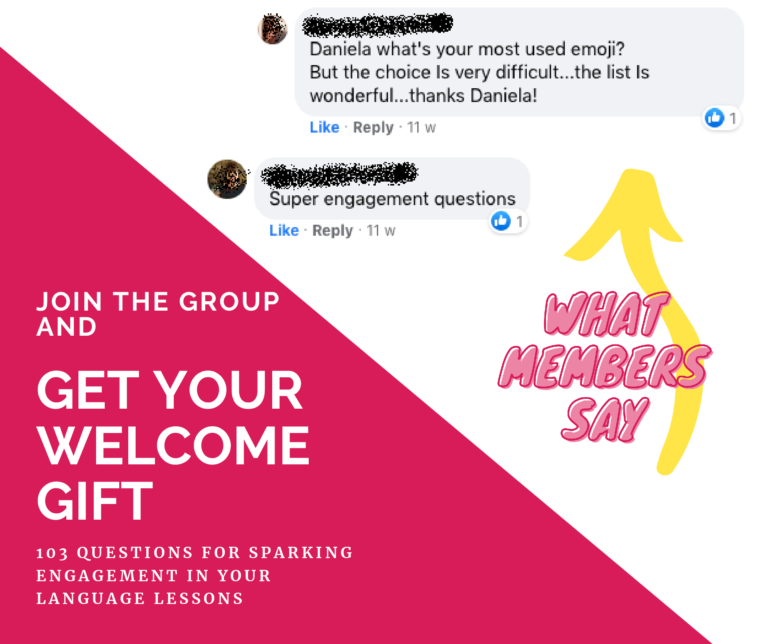
Teaching languages in companies to employees (aka corporate language training) is a totally different beast to teaching in schools. When it comes to teaching groups in organisations, your training offer ought to be compelling, guarantee results and be engaging, as well. What’s very appealing for the committees is the so-called experiential learning. And that can be transferred into language teaching, too. In this article you’re going to learn about experiential learning in companies and how this can be applied to language learning. Also, you’re going to learn about how to craft an awesome training offer that makes you stand out from the crowd of language teachers and get all your dream clients onboard.
I conceived this piece of training specifically for language teachers who wish to work in companies and would like to expand their training offer to more programmes than individual tutoring only.
These are the key questions I’m going to answer in this post:
- Where can you start for creating a corporate language training offer?
- How can you make your corporate language training offer stand out?
- What is the formula for making your clients say “yes” to your offer?
Let’s get started.
Where can you start for creating a corporate language training offer?
Imagine a company asked you to send an offer related to a language programme they want to get delivered for their employees. Usually you would discuss this in a meeting with the committee.
Firstly, you would discuss the following scores:
- Who the participants are, who they want to train
- The reason why they want those employees to get trained
- Is there any specific goal to achieve, for instance a language certification?
- What is the schedule they have in mind? You’ll need to understand the amount of time the participants could be available and for how long. In fact, the majority of the corporate language training courses take place during the working hours
- Previous experiences: have these people been involved in corporate language training courses before? How did they get on?
- If you needed to choose a specific situation where you would like to see your employees being getting on well, what would that situation be?
- Finally, how do you know your employees have got to the expected results? Here focus the committee attention on the specific behaviours.
Once you’ve got the overall picture of the committee’s request, you want to find out about any other request that lays behind the first request for a language programme. By that I mean:
- Apart from the results related to the language skills improvement, what else would you like to achieve through this programme?
- If you wanted to pick one behaviour you would like to see in your employees at the end of the programme, what would it be?
In that latest part of the needs analysis interview you want to help the committee to bring out any other “soft skill” he or she would like to develop. For instance: negotiation skills, leadership, etc.
How can you make your corporate language training offer stand out?
The key ingredient is experiential training. Experiential training refers to a specific type of training programmes based on training metaphors. These are disciplines usually belonging to sports or arts (e.g. sailing, acting, climbing, cooking, horse riding, etc.) that have the power to challenge the participants and to trigger meaningful reflections related to the targeted skills they need to develop. So, for instance, a popular training metaphor for training courses in leadership is horse riding.
In experiential training courses people develop skills by making experience of a training metaphor and by debriefing that experience thanks to the facilitation of a trainer who helps them to make sense of what they experienced and to repurpose that awareness for developing the targeted soft skills.
For instance, in creating your corporate language training offer you may want to propose a learning-by-doing experience based on the metaphor of cooking.
Another cool metaphor is drama. It’s also probably the easiest one to put into action. The students would be involved in a drama project where they’d have plenty of opportunities for developing their language skills as well as for working on soft skills (e.g. negotiation skills, leadership, assertiveness, etc.) which are essential for growing within an organisation. That’s where I am very good at: designing English language corporate training for my corporate clients. They love drama!
What is the formula for making your clients say “yes” to your offer?
My suggestion is to create a training offer that reflects all the formal requests made by the committee. Therefore, first of all the offer should give peace of mind about the fact that it can really take the students to the expected results. Secondly, it should give something more: pick a metaphor (a discipline you are good at) and try to figure out how this could harmonically match with the language programme.
Very last tip: when you write the proposal, try to use your committee’s words as much as possible. A good needs analysis interview is key also for this reason.
Wrapping up
Experiential training is pretty trendy in the organisational world. Why not taking this chance? The opportunity for you here is HUGE: you could offer your students to experience a proper language programme, totally reliable in terms of effectiveness, and with a fresh twist for making the whole thing an enjoyable experience, too.
If you need help in crafting your awesome corporate language training offers for your clients, feel free to get in touch with me: I’ll be more than happy to help you!
Want more support?
Join the Facebook group Independent Language Teachers Collective to get daily advice, tons of free training and to branch out with other independent language teachers like you!
ALSO…
Available only for the Collective members: free list 103 question for sparking engagement in your language lessons.
This is what members say about the freebie:

Join in the Collective and grab your welcome gift:


